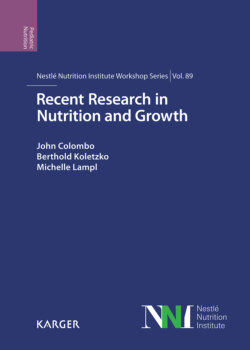Читать книгу Recent Research in Nutrition and Growth - Группа авторов - Страница 8
На сайте Литреса книга снята с продажи.
Foreword
ОглавлениеIt is now well understood around the world that good nutrition plays a major role in the health of individuals at all stages of development and life. In recent years, detailed clinical research into the effects of nutrition on growth has brought a wealth of new data that are giving fresh understanding to this key area of development particularly in the first 1,000 days of life: appropriate nutrition at this time can program and prepare the body for long-term health. Poor nutrition can contribute to obesity or stunting and can also have adverse effects on brain development and cognition.
The 89th Nestlé Nutrition Institute Workshop with the topic “Recent Research in Nutrition and Growth” was held in Dubai (United Arab Emirates) on March 26–29, 2017.
To lead the debate, the Nestlé Nutrition Institute brought together an eminent international faculty, chaired by: Michelle Lampl, Samuel Candler Dobbs Professor, Co-Director of the Predictive Health Institute, and Director of the Center for the Study of Human Health, Emory University, Atlanta, GA, USA; Berthold Koletzko, Professor of Pediatrics, Dr. von Hauner Children’s Hospital, Ludwig Maximilians University of Munich, Munich, Germany; and Prof. John Colombo, Professor of Psychology, University of Kansas, and Director of the Kansas Intellectual and Developmental Disabilities Research Center and of the Life Span Institute, Lawrence, KS, USA.
The first session, opened and chaired by Prof. Michelle Lampl, examined the role of the biological systems of the body as contributors to healthy growth, looking at bones, muscles, and fat tissues and the optimal nutrition required for dynamic function. The speakers in the session presented the results of recent research into complex cellular growth, and how it is influenced by genetic, hormonal, nutritional, environmental, lifestyle, and pathological factors. The causes and consequences of obesity were analyzed, looking at the growth and function of adipose tissue in the body. When nutritional needs are not met, or are overmet, the musculoskeletal system, bone, and tissue quality is compromised. While we know that timing is everything in fetal development, the experts concluded that there is still much to discover regarding the timing of growth in children and how best to support that growth nutritionally.
The second session, chaired by Prof. Berthold Koletzko, presented updates on the latest research on dietary interventions in the areas of growth and body composition, looking at both obesity and stunting worldwide. Recent studies have shown that excessive early weight gain in infants can set a pattern for weight gain in adulthood, leading to obesity and disease. New insights into the nutritional impact of metabolic regulation in infants were also reviewed, utilizing modern research techniques which are paving the way for interventions to improve long-term health outcomes. A breakthrough in research conducted in Germany was discussed, which demonstrates that the quality as well as the quantity of protein provided to babies affects weight and length gain. The importance of the brief complementary feeding period was also reviewed, underlining the importance of timing, composition of foods, and the mode of feeding in terms of the long-term impact of the nutritional choices made by parents and caregivers for the health and well-being of their child. Stunting is a major issue in many developing countries, and the session looked at the causes of limited linear growth and successful dietary and educational interventions in pregnancy and early childhood. The second session concluded with an examination of the role of micronutrients in relation to infant growth, noting that the World Health Organization estimates that over 2 billion people globally are deficient in vitamins and minerals that are essential for human growth and metabolism.
The third session with Prof. John Colombo focused on neurocognitive development in infancy and early childhood and the role of nutrients in supporting brain growth and function. The debate highlighted the interface between cognitive development and nutritional science, emphasizing the need for nutritionists and behavioral scientists to work closely together for the best research outcomes. Presentations included a detailed look at the standardized measures of neurocognitive development in infancy and early childhood, which are designed to identify children who are at high risk of late developmental delay. The role of neuroimaging research was identified as offering science a richer understanding of the structure, function, and behavior of the brain during the rapid and highly sensitive early development period of childhood. The potential causes for altered neurodevelopment are diverse and vast, and can include environmental factors, genetic influences, and early-life nutrition and deficiencies. The speakers also presented results of recent trials which looked at the effects of nutrition on the development of higher-order or executive functions, including the long-term benefits of long-chain polyunsaturated fatty acid supplementation in infancy, which resulted in improved performance on tests of impulsivity and attention control.
In early childhood, nutrition and development are closely intertwined, and this workshop took a multidisciplinary approach, bringing together scientists, nutritionists, and psychologists. We very much appreciate the participation of all our distinguished chairpersons and speakers who highlighted key areas of recent research and stressed potential new areas to explore in order to improve health outcomes of infants around the globe.
We also gratefully acknowledge all the participants in the audience who contributed to the formal and informal discussions throughout the workshop, as well as the many thousands who participated via the webcast.
We would like to congratulate everyone involved in the organization of the workshop at the global and regional levels.
Dr. Natalia Wagemans
Head of Nestlé Nutrition Institute
Vevey, Switzerland
